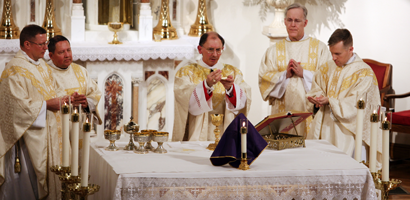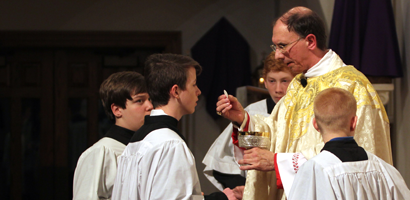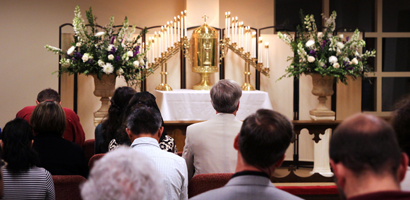 Holy Thursday: Jesus tells us to love one another because His love dwells in us
Holy Thursday: Jesus tells us to love one another because His love dwells in us
CHARLOTTE — St. Patrick Cathedral was filled nearly to capacity Thursday evening as Bishop Peter Jugis celebrated the Mass of the Lord’s Supper. The liturgy marked the start of the Triduum, the three holy days preceding the Resurrection of the Lord at Easter.
The Mass of the Lord's Supper recalls Jesus' institution of the Eucharist at the Last Supper, His washing the feet of His disciples, His agony in the Garden of Gethsemane, and His betrayal and arrest.
When Jesus washed the feet of the Apostles, it was more than a physical act of humble service, Bishop Jugis noted during his homily. “More importantly,” he said, it was “about an interior washing.”
His disciples were focused on the earthly act, but Jesus was speaking on a heavenly level, he explained.
When Jesus told His disciples that they had been washed, He meant that “they had been cleansed by Jesus’ grace and His love – through the three years that they had been spending with Him, listening to His teaching and observing His miracles. Their hearts were now filled with Christ’s grace and love, which has acted as a purification of them – (it) has washed them clean.
“He and His teaching have penetrated right into their hearts, and they have been transformed, become true disciples, through this interior washing.”
All of His disciples were graced except for Judas Iscariot, who was soon going to betray the Lord, Bishop Jugis noted. Jesus said as much with His words, “Not all are clean.”
Bishop Jugis also reflected on Jesus’ words to His disciples to “love one another as I have loved you.”
“Why does He say it’s a new commandment? What’s so new about it? After all, you can find that phrase even in the Old Testament law,” he said. “It’s new because you have been washed interiorly with Christ’s love and grace, and Christ is living within you. That’s what’s new!”
“It’s no longer just words: ‘love one another.’ But now, having been washed,” Bishop Jugis continued, Jesus is saying, “‘I am living within you.’ That makes it a new commandment, a new mandate.”
Jesus is instructing us to demonstrate Christian love, not simply human love, to others, he explained.
“That’s the essence of Christianity. It’s not just a religion of words. It’s a religion of a Person. A Person comes to live in your soul. You come to love a Person. You have a relationship with Him – not just with words or commandments, but with Jesus.
“That’s the newness of the new commandment: to love because He is within you.”
Bishop Jugis also reflected on the Holy Thursday liturgy as the institution of the Eucharist and of the priesthood.
Priests perpetuate Jesus’ ministry through the ages, he said, “to continue His interior cleansing of souls that takes place through the apostolic ministry of preaching His Word, teaching His commandments, celebrating the sacraments and shepherding the flock.”
“Where would we be without the ordained ministry?” especially in administering the sacraments of baptism, confession and Holy Communion, he said.
Baptism washes us clean, and the Eucharist continues to wash us with grace, nurturing us and enabling us to grow in holiness, he said.
 “You can’t have a Church without the priesthood and the Eucharist. They are two essential elements that Jesus instituted to make up His Church.”
“You can’t have a Church without the priesthood and the Eucharist. They are two essential elements that Jesus instituted to make up His Church.”
In conclusion, Bishop Jugis touched on the words of Jesus in the Gospel of John: “He loves them to the end.”
Jesus loves us even to the cross, the end, “because that is where the totality of Jesus’ self-giving love is going to be shown,” he said.
Jesus’ suffering and death on the cross is “the exclamation point” of His love for us, a love which was shown earlier at the Last Supper, when He instituted the priesthood and the Eucharist, Bishop Jugis said.
Those words encapsulate “a beautiful teaching in a few short lines from St. John’s Gospel, chapter 13, but so full of grace and meaning and love for each one of us now as we enter into the sacred Triduum.”
At the end of the Holy Thursday Mass, altars in every church were stripped bare, candles and lights were extinguished, and the Blessed Sacrament was transferred to a temporary altar of repose until Easter – outwardly demonstrating the sense of the Church's bereavement during the time of Christ's Passion and burial.

Catholics then spent time in Eucharistic Adoration, recalling Jesus' words to His sleepy disciples in the Garden of Gethsemane, "Could you not keep watch with Me for one hour?"
On Good Friday, no Mass is celebrated.
— Patricia L. Guilfoyle, editor


